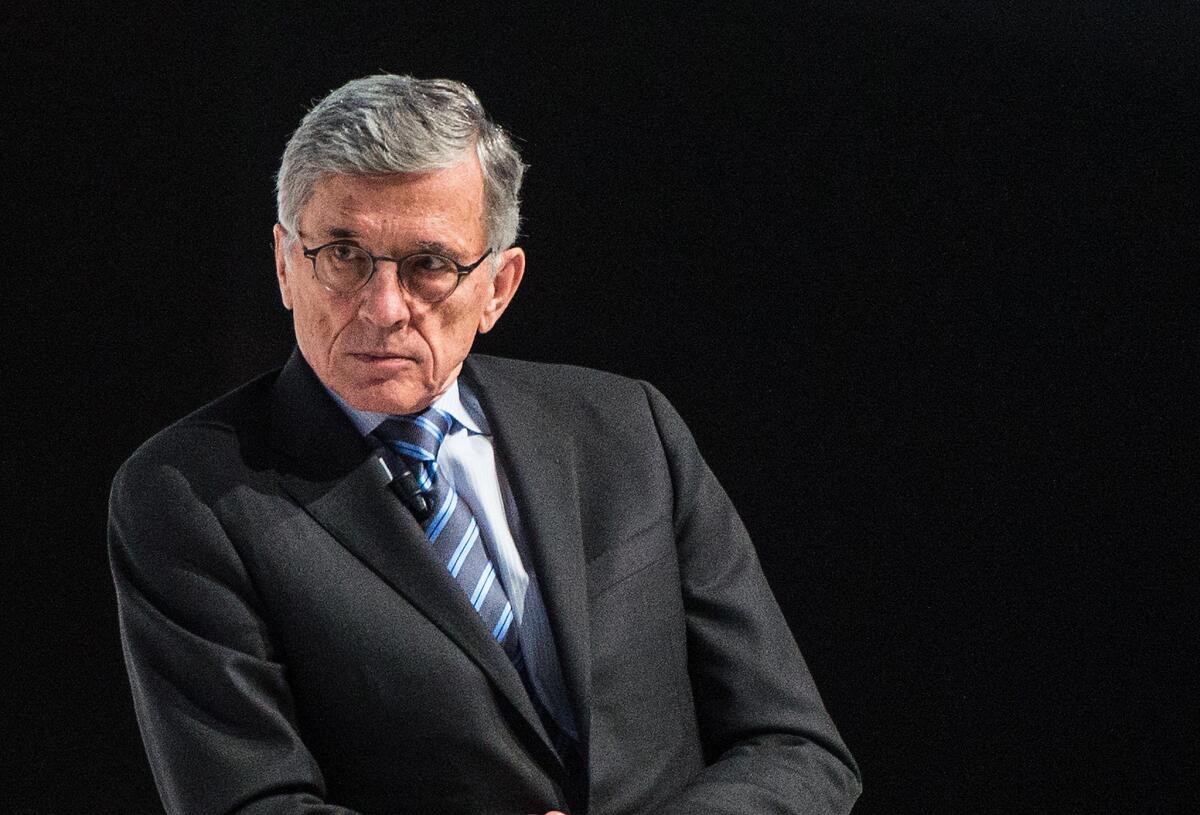Lifeline subsidy program would cover broadband under FCC chief’s plan

Federal Communications Commission Chairman Tom Wheeler speaks during the Mobile World Congress 2015 conference in Barcelona, Spain, in March.
Reporting from Washington — A federal program that subsidizes phone service for low-income consumers would be overhauled to help expand access to high-speed Internet under a proposal Thursday by the head of the Federal Communications Commission.
Households would have the choice of using the monthly $9.25 Lifeline subsidy to pay for a broadband connection or a phone line, according to FCC Chairman Tom Wheeler’s plan.
“Broadband is key to Lifeline’s future,” he said in a blog post.
High-speed Internet has become an essential service available in 95% of households with annual incomes of more than $150,000, Wheeler said.
But nearly half of households with incomes of less than $25,000 a year do not have a high-speed connection, he said.
“A world of broadband ‘haves’ and ‘have-nots’ is a world where none of us will have the opportunity to enjoy the full fruits of what broadband has to offer,” Wheeler said.
To reduce the so-called digital divide, Wheeler said he wanted to “reboot Lifeline for the Internet age.”
About 12 million households participated last year in the Lifeline, which began in 1985 to ensure that all Americans had access to basic telecommunications services.
The program is funded by a small fee on consumers’ monthly phone bills and spent about $1.7 billion last year. Recipients get the monthly subsidy, which is paid to their telecom provider, and can use it to offset the cost of one land-line or wireless phone line.
Households would be limited to one subsidy, so consumers would have to choose to apply it to voice or broadband service.
Wheeler’s proposal would not expand monthly fees to fund the program to consumers’ broadband bills, which some critics have warned could be coming after the FCC changed the classification of Internet service providers when it approved net neutrality rules in February.
If Wheeler’s proposal is approved by commissioners at their June 18 meeting, the agency would seek public comment on establishing minimum standards for broadband and phone service “to ensure that both Lifeline subscribers and ratepayers are getting the best possible value from the service delivered.”
The five-member agency’s other two Democrats, Mignon Clyburn and Jessica Rosenworcel, have publicly urged Lifeline to be expanded to include broadband so the proposal is expected to pass.
Civil rights and public interest groups cheered the plan Thursday.
“The expansion of Lifeline to support broadband services will give millions of Latinos opportunities for social and economic advancement,” said Eric Rodriguez, who heads the public policy office at the National Council of La Raza.
But Republicans on the FCC and in Congress have criticized the program as wasteful. Some lawmakers have dubbed it “Obamaphone” because of rapid growth in spending in recent years.
The program’s costs increased from about $809 million in 2005, when subsidies were allowed for wireless phones, to about $1.7 billion last year.
“I would prefer to ensure that there are adequate controls and deterrents in place before considering a revamp of the program to include broadband,” Michael O’Rielly, one of two Republican commissioners, said in February.
In 2012, the FCC enacted changes designed to eliminate waste, fraud and abuse in the program, including creating a database to prevent multiple phone companies from receiving subsidies for the same subscriber.
The 12 million Lifeline participants last year were up from 7 million in 2008, according to the Government Accountability Office.
But the number is down from a peak of 18 million households in 2012, and spending has been reduced from $2.2 billion that year partly because of the reforms, the GAO said in a March report.
The same overhaul aimed to modernize the program and the FCC launched 14 pilot projects to determine how Lifeline could be used to expand access to high-speed Internet service.
On Thursday, Wheeler also proposed a major change in the way the program is operated.
Phone companies now determine if a household is eligible for a Lifeline subsidy, “a situation that invites waste and fraud while burdening those providers who do want to comply,” he said.
Wheeler wants to take the eligibility determination away from the companies and give it to an independent third-party administrator.
CTIA -- the Wireless Assn., whose members include AT&T Inc., Verizon Communications Inc., Sprint Corp. and T-Mobile U.S. Inc. -- said it would work with the FCC on changes to the program to make it “fiscally responsible as well as responsive to Americans’ reliance on mobile solutions,” said Scott Bergmann, the trade group’s vice president of regulatory affairs.
Reps. Fred Upton (R-Mich.) and Greg Walden (R-Ore.) said in a joint statement Thursday that Wheeler’s plan “misses the mark.”
“Simply expanding the program without ensuring its effectiveness or longevity is the wrong approach if we’re going to do right by those who pay for the program, and those who depend on it,” said the lawmakers, who want Lifeline’s annual spending to be capped.
Follow @JimPuzzanghera on Twitter
More to Read
Inside the business of entertainment
The Wide Shot brings you news, analysis and insights on everything from streaming wars to production — and what it all means for the future.
You may occasionally receive promotional content from the Los Angeles Times.











